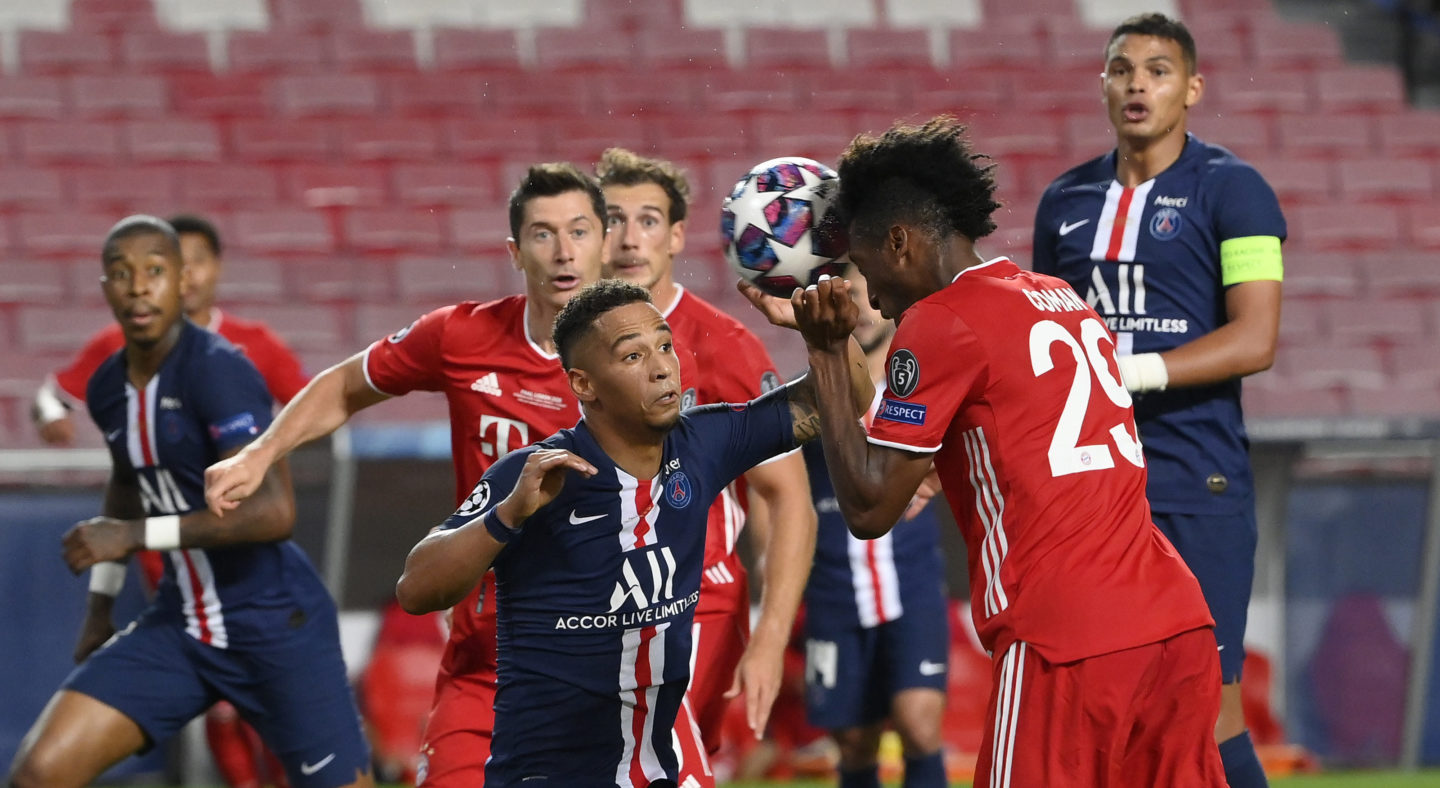
How to harness the power of nonmarket strategy
Forward-thinking leaders proactively shape their external environment, turn uncertainty into certainty, and create substantial value in the process....
Audio available

by Niccolò Pisani Published March 24, 2021 in Technology • 8 min read
The images of the empty stadium in which FC Bayern celebrated the Champions League final victory over Paris Saint-Germain in Lisbon back in August will make history. They are a vivid example of how disruptive COVID-19 was for football in 2020. Nearly a year into the pandemic, we are becoming somewhat more used to football games taking place in deserted stadiums.
Aside from the more aesthetic aspects of a cheerful stadium, the outbreak of the COVID-19 pandemic has resulted in major losses for football clubs. Take the example of FC Barcelona, the highest-grossing football club in Europe in the 2018–2019 season with more than €800 million in revenues. In a normal year, roughly 20% would be match-day revenues, 35% broadcasting, and 45% commercial revenues. With empty stadiums and fans severely limited in their possibility to travel, not only have match-day revenues collapsed, but a significant part of the commercial revenues also suffered as a result. Think of all the shirts and accessories that are sold in shops at the stadiums, in airport duty-free areas, or in high-street prime locations around the world. Not surprisingly, at the end of 2020 there was even the spectre of a bankruptcy ahead of FC Barcelona, if the club failed to reach an agreement with its players for a pay cut of up to 30%.
All football fans surely miss the unique atmosphere of a jam-packed stadium. The encouraging news about the efficacy of COVID-19 vaccines increases our hopes that we may come back to at least some sort of normality relatively soon. In the best-case scenario, travel may start to pick up again in summer 2021 and perhaps even stadiums will, at least partially, reopen sometime in 2021. That said, there are still many uncertainties as to what the “new normal” will look like, including for the world of football. And how quickly we will be able to reach this new post-pandemic phase is also still to be determined.
Even with the positive prospect of mass vaccination in sight, the disruption that occurred in 2020 will have a lasting impact on crucial aspects of the global business of football. While we can of course reasonably expect that football clubs will see their match-day and commercial revenues grow again in the “new normal”, the reality is that COVID-19 has accelerated radical changes that mass vaccination will not overturn. Digital was already changing several aspects of the football industry before the pandemic; it is now set to disrupt the game sooner than we think.
How will that happen? Expect the following three trends to fundamentally reshape the sport.
Future fans will engage with their favorite clubs in radically different ways from older generations.
In response to the COVID-19 disruption, football clubs engaged in a series of ground-breaking activities to establish radically new ways to engage digitally with their millions of fans worldwide. Take the example of the summer tours that elite football clubs have undertaken across Asia in recent years to enhance their visibility in a region where interest in football has grown remarkably over the past decade. The COVID-19 pandemic forced clubs such as Liverpool to cancel their tours last summer. AC Milan had to do the same with its planned tour in China. However, the Italian club quickly reacted to the cancellation, launching a digital summer tour that offered digital experiences to millions of Chinese fans, ranging from interacting with players to completing a virtual tour of the club’s premises and the city of Milan. The digital tour ended in September with more than 20 million impressions on digital platforms.
Creating new ways to engage with fans in the digital space also gave clubs the opportunity to establish additional synergies among the different channels they used. Consider what Real Madrid did during La Liga’s enforced lockdown. The club created an “Ask the players” series on its Twitter account, offering fans the opportunity to submit questions that were then answered directly by two Real Madrid players in videos posted on the Real Madrid official YouTube account. This very successful initiative reached over 6 million followers. The club also created an Instachat that became very popular among its fanbase, especially during the repeats of the team’s legendary wins, which were broadcast on the Real Madrid TV channel.
In this rapidly changing context, football clubs that had already started investing in digital capabilities before the coronavirus crisis and quickly accelerated their digital transformation efforts during the pandemic have seen their chance of being futureproofed increase dramatically. Future fans will engage with their favorite clubs in radically different ways from older generations. The coronavirus crisis has only accelerated the underlying transformation of fans’ engagement. The above-mentioned digital activities will certainly be offered again in the future, and new similar initiatives launched even though travel will resume in the aftermath of the COVID-19 crisis. Expect this to become an ordinary way for fans around the world to engage with their favorite football teams in the future.
The recent moves made by Spotify – the dominant player in the global music streaming industry – are illustrative of where the frontline of the streaming war will be in the foreseeable future. During the pandemic, the Swedish-based company completed the purchase of the podcasting company Megaphone for more than $230 million, the last of a series of acquisitions enabling it to become the leader in the production of original programming and advertisements in the podcasting environment. In its attempt to accelerate its quest to become the leader in all things audio, Spotify has also recently partnered with Songkick, a ticketing platform owned by Warner Music, to promote live streaming events directly from its app.
Some football clubs have been very quick to respond to these changes in the streaming industry. For example, in the midst of the pandemic AC Milan launched its weekly podcast series and forged an exclusive partnership with Roc Nation – one of the world’s leading entertainment companies – to promote the club through these innovative channels. One of the first initiatives by the legendary Italian club was the creation of “From Milan with Love,” a livestreamed concert presented by Grammy-award winning producer DJ Khaled, which included the performance of stars such as Alicia Keys and Lola Ponce alongside the appearance of sports personalities like former AC Milan player Kaká. The event was streamed in May to support all the individuals who were on the frontline fighting the coronavirus. Its viewing audience ran into millions.
Given this huge success, in November AC Milan and Roc Nation created another virtual live event, “From Milan with Love: Next Gen.” AC Milan’s Digital, Media & The Studios Director, Lamberto Siega, confirmed: “This second live concert event was again a huge success, with over 18 million people reached through all the content, 50% more engagement and an increase of 27% in impressions compared with the first concert. The partnership with Roc Nation allows AC Milan to combine the power of music with the fundamental values of sport that our club embodies. It is also important to emphasize that this event has given the opportunity to share with such a broad audience the commitment of both AC Milan and Roc Nation to inclusivity, equality, and cultural diversity.”
Of course, all this new streamed content has been offered not only via the club’s website and proprietary apps, but also through entirely new channels. In December 2020, AC Milan launched its official channel on Twitch precisely to engage with its younger fanbase. Lamberto Siega emphasized: “Twitch gives us a unique opportunity to connect with the younger segment of our fans base. One in four Twitch viewers are less than 17 years old. We often forget that our next generation of supporters does not want to spend 90 minutes in front of a TV watching a football game. If they do, they want to have additional content via a second screen, be it a laptop, a tablet, or a mobile phone. Our channel on Twitch enables us to provide all this additional content that our younger fans will be able to access anytime and from anywhere.”
The COVID-19 pandemic has offered football clubs an even stronger incentive to tap into the potential of esports. Formula One has also already started to invest into professional videogaming, as esports can capture the next generation of consumers given that the younger segment of Formula One followers – of whom 15% are estimated to be under 25, with another 30% in the 25–34 age range – spends an increasing amount of time gaming. But it would be a mistake to think that football has been lagging anywhere behind Formula One. Christian Volk, eFootball and Gaming Director at FIFA, explained: “In the sport environment, EA SPORTS FIFA has built the most authentic sport simulation games. And the esports environment that we have been able to create at FIFA in the past few years through a series of truly international championships has certainly been pioneering for the whole sport sector.”
Unsurprisingly, clubs are looking at this phenomenon with increasing attention, conscious of the importance of triggering interest among the youngest segment to make sure their brands remain relevant as their fanbases grow older. The rise of gaming was there already well before the pandemic, as Christian Volk also confirmed: “A very insightful survey shows that football fans in the 10–35 age range from seven key countries were spending more time on gaming than on any other activity already before COVID-19.” Newzoo estimates that in 2020 there were 272 million occasional esports viewers and 223 million esports enthusiasts. Annual growth is forecast to be higher than 10% in the years to come.
COVID-19 has clearly accelerated this pattern, but also generated interesting new dynamics that will contribute to further reshaping the industry. Christian Volk clarified this: “On the one hand, the coronavirus pandemic has had the obvious effect of further mainstreaming gaming. Next to competitive gamers and teams that were already populating our FIFAe tournaments, new gamers have started to engage with the EA Sports FIFA franchise as a form of casual football entertainment. On the other hand, fueled by COVID-19, the boundaries between football and gaming have been further blurring. For example, during the lockdown, football icons started to play with their FIFA eFootball counterparts in matches that have enjoyed huge success. This has generated further interest in gaming at large, but also for esports events as they are increasingly seen by young fans as an ideal way not just to actively engage with, or even represent their preferred clubs but also to self-actualize and make a name for themselves.”
This is creating an entirely new ecosystem that will drive the growth of esports in the future. It will also fundamentally change the way in which clubs build their brand equity and awareness among their fanbases. FIFA has been at the forefront of this change. To this end, the early partnership with EA SPORTS and the popularity of its football game have been key enablers. Volk concludes: “We are just beginning to unlock the full potential of gaming for the entire football ecosystem. I’m convinced it will be a major driver for fan engagement, building brand equity, and innovation in the years to come.”
For any football club, the performance of the team is and will continue to remain a fundamental trigger for generating enthusiasm and engagement among its fans worldwide. At the same time, embracing the fundamental changes that are transforming the industry is equally critical if clubs are to be fit for the future.
Expect the above three trends to fundamentally reshape the future of the football industry. The recent initiatives launched by AC Milan, Real Madrid, and FIFA on these fronts corroborate that, in the aftermath of COVID-19, digital is set to change the global business of football sooner than we think.

IMD Professor of Strategy and International Business
Niccolò Pisani is Professor of Strategy and International Business at IMD. His areas of expertise include strategy design and execution as well as international business, with an emphasis on globalization and sustainability. His award-winning research has appeared in the world’s leading academic journals and extensively covered in the media. His work has been featured in both Harvard Business Review and MIT Sloan Management Review. He has also written several popular case studies that are distributed on a global scale.

June 26, 2025 • by Michael Yaziji in Strategy
Forward-thinking leaders proactively shape their external environment, turn uncertainty into certainty, and create substantial value in the process....
 Audio available
Audio available
June 4, 2025 • by Stéphane J. G. Girod, David Branch in Strategy
The traditional e-commerce model is on its last legs. In a disrupted luxury landscape, brand leaders are shifting focus to unified commerce, hyper-personalization, and deeper digital storytelling to completely reinvent the customer...

June 3, 2025 • by Anna Cajot in Strategy
Donald Trump’s tariff tactics offer a bold case study in game theory in negotiations. By setting the rules early, limiting options, and projecting power through credible threats, his approach shows how negotiations...

May 27, 2025 • by Robert Earle, Karl Schmedders in Strategy
With solar power flooding grids, the duck curve creates both challenges and opportunities for businesses. Learn how smart companies can harness this shift to cut costs and boost efficiency....
Explore first person business intelligence from top minds curated for a global executive audience